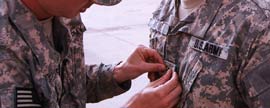A Relief for Cause report is not punishment. The command can implement punishment as they deem appropriate. See AR 623-3 regarding the relief for cause process and the appeal process.
The command can proceed with both a relief for cause report (if appropriate), and punishment such as an Article 15 or courts martial, etc.














Comments
Hassan Taahid
All this is very interesting because I was relieved from an assignment , working on a communications team. The next day, I was presented a relief for cause memo stating that in 30 days I would be given a relief for cause NCOER, after I had already been released. I never conducted any misconduct, nor was I ever given a tasked, counseled or instructed to complete anything that I never completed.
I’m trying to find out how I can be removed and then counseled about my removal, after the fact.
Mark Gerecht
Here’s what the AR 600-20 says:
2–17. Relief for cause
a. When a higher ranking commander loses confidence in a subordinate commander’s ability to command due to misconduct, poor judgment, the subordinate’s inability to complete assigned duties, or for other similar reasons, the higher ranking commander has the authority to relieve the subordinate commander. Relief is preceded with formal counseling by the commander or supervisor unless such action is not deemed appropriate or practical under the circumstances. Although any commander may temporarily suspend a subordinate from command, final action to relieve an officer from any command position will not be taken until after written approval by the first general officer (to include one frocked to the grade of brigadier general) in the chain of command of the officer being relieved is obtained. Any action purporting to finally relieve an officer from any command position prior to the required written approval will be considered for all purposes as a temporary suspension from assigned duties rather than a final relief from command for cause. If a general officer (to include one frocked to the grade of brigadier general) is the relieving official, no further approval of the relief action is required; however, AR 623–3 concerning administrative review of relief reports remain applicable. b. If a relief for cause is contemplated on the basis of an informal investigation under AR 15–6, the referral and
comment procedures of that regulation must be followed before initiating or directing the relief. This does not preclude a temporary suspension from assigned duties pending completion of the procedural safeguards contained in AR 15–6. Any action purporting to initiate or direct a relief for cause on the basis of an informal investigation under AR 15–6 taken prior to completion of the procedural safeguards of AR 15–6 will be considered for all purposes as a temporary suspension from assigned duties.
AR 623-3 paragraph 3-56f states:
requirements.
f. The minimum rater and senior rater qualifications and the minimum rating period are 30 rated days. The fundamental purpose of this restriction is to allow the rated NCO a sufficient period of time to react to performance counseling during each rating period. Authority to waive this 30-day minimum rating period and rater and senior rater qualification period in cases of misconduct is granted to the first general officer in the chain of command or an officer having general courtmartial jurisdiction over the relieved NCO. The waiver approval will be in memorandum format and attached as an enclosure to the NCOER (see para 3–36 and fig 3–3).
Without know the specifics of your case I do not know if the 30 day period was waived. Based on what you stated it appears they gave you a notice saying you would be relieved in 30 days. If this is so it would be incorrect and you could appeal. The purpose of the 30 days is to explain your short falls and give you time to make corrections.
Hope this helps.
TOP.
carl
what if the relief for cause is given before a pending civilian case has been adjudicated.
eric
can you give a relief for cause to a SGT that is holding a SSG position? a coworker was fired from a SSG position and put back into a SGT slot. he is an E-5. is this right or is the SFC just using this as a threat to scare and bully him?
Mark Gerecht
Eric,
I have a rough draft answer in the works. I hope to have the final one out to you by Monday. My apologies for the delay as I am on travel but also your questions is rather in depth and has about 4 questions wrapped into one.
Mark Gerecht
Eric, Sorry for the delay.
Your question has several parts but before we get into your specific questions let’s review the relief for cause process.
1. First relief for cause reports are for serious incidents or Soldiers that consistently fail to perform to standard. The process for relief for cause reports are outlined in AR 600-20, AR 623-3 and DA PAM 623-3. There are different procedures for Officers and NCOs.
2. The leader cannot by himself relieve the NCO. He would have to have the support of the senior rater and reviewer and in my opinion the commander.
3. When is a relief for cause given:
a. DA PAM 623-3: A Relief-for-Cause occurs when the NCO’s personal or professional characteristics, conduct, behavior, or performance of duty warrants removal in the best interest of the U.S. Army (see AR 600–20, para 2–17).
b. AR 600-20 para 2-17: When a SC loses confidence in a subordinate commander’s ability to command due to misconduct, poor judgment, the subordinate’s inability to complete assigned duties, or for other similar reasons, the SC has the authority to relieve the subordinate commander. Relief is preceded with formal counseling by the commander or supervisor unless such action is not deemed appropriate or practical under the circumstances. Although any commander may temporarily suspend a subordinate from command, final action to relieve an officer from any command position will not be taken until after written approval by the first general officer (to include one frocked to the grade of brigadier general) in the chain of command of the officer being relieved is obtained. Any action purporting to finally relieve an officer from any command position prior to the required written approval will be considered for all purposes as a temporary suspension from assigned duties rather than a final relief from command for cause. If a general officer (to include one frocked to the grade of brigadier general) is the relieving official, no further approval of the relief action is required; however, AR 623–3 concerning administrative review of relief reports remain applicable.
4. DA PAM 623-3 para 3-9 states: The minimum rater and senior rater qualifications and the minimum rating period are 30 rated days. The fundamental purpose of this restriction is to allow the rated NCO a sufficient period to react to performance counseling during each rating period. Authority to waive this 30-day minimum rating period and rater and senior rater qualification period in cases of misconduct is granted to a general officer in the chain of command or an officer having general courts-martial jurisdiction over the relieved NCO.
5. Given item “c” above was the NCO given a if you will “notification of relief” meaning was he counseled that the command was considering a relief for cause? The counseling should cover the whole Soldier and focus the areas the Soldier needs to improve upon over the next 30 days and include a comprehensive plan of action and assessment plan. Typically in my experience this counseling takes place in an initial counseling session and then has 3 weekly assessment counseling session that document the Soldier’s performance.
a. If the Soldier responses well to the counseling he is not relieved. However if the Soldier back slides at a later date in the same areas, there is no need to conduct the relief counseling again. As long as the command agrees the Soldier can be relieved.
b. If the Soldier later has another issue and this issue was not covered in the previous relief counseling then it may be necessary to conduct another 30 day evaluation process. This is why it is important to make the initial counseling absolutely comprehensive.
c. In serious cases the need for counseling may be waived, see “3” above.
6. Any time a relief action is considered the unit leadership should gather their documentation and discuss the matter. Should the leadership deem a relief is appropriate they should coordinate any action with the local JAG prior to taking action. I have personally seen many cases in which inexperienced leaders made decisions they thought were appropriate under the relief process only to be incorrect.]
7. Local commands sometimes have specific policies and procedures that further define and clarify the actions necessary for a relief.
8. My best recommendation when it comes to a relief action is to:
a. know the regulations
b. gather the facts
c. emotionally step away from the issue
d. ensure you involve the chain of command before you taken any “relief” associated action
e. discuss the issue with the chain of command to ensure you have their support and then involve a Subject Matter Expert (SME) usually the unit S-1 and the local JAG. Use both resources.
f. now you are prepared to develop your plan of action. Once develop have it reviewed by JAG and then implement the plan of action.
Now to your specific questions:
Question 1: Can an E-5 serving in an E-6 position receive a relief for cause?
That depends. Was the Soldier properly trained and certified to serve in the E-6 position? Was the reason for the relief a basic skill or a skill the Soldier is reasonably expected to be competent in? Was the Soldier working outside his area of expertise (MOS)? Was the Soldier working on a task that was outside their certified skill level (E-5 performing a specific E-6 task)
It is an honor to work in a position above your grade however when a chain of command does this they also accept some level of risk. For example let’s say that a Soldier is working to solve a technical problem and that technical problem is specifically laid out in an MOS manual as a 30 level (E-6) task. The Soldier does not implement the task correctly and the command wants to relieve him for this action. They may have a hard time relieving the Soldier if the Soldier is not a graduate of the appropriate level of professional military education, has not received training or certification on the task. Another example might be: You take an E-5 mechanic and place him in the Unit S-1 to be the S-1 NCOIC (an E-5 or higher position) and he fails to do the job properly. Then the command desires to relieve him. If the relief is based on a task that would not normally be part of his duties as a mechanic or basic NCO responsibilities of an E-5 it may not be appropriate or legal to relieve the Soldier.
On the other hand if the Soldier is being relieved because he has failed to perform a task that any Soldier or leader should be competent in then yes a relief is a possible course of action. For example the leader is involved in a negligent weapons discharge. Regardless of rank the Soldier especially a leader has usually been trained, briefed, etc on this issue.
Question 2: Can the leader then take the relieved Soldier and place them in an E-5 position?
Yes, The Soldier is an E-5 and can fill a valid E-5 slot. If the Soldier is incapable of filling the E-5 slot or the chain of command believes the Soldier is not trustworthy or competent enough to fill an E-5 slot he may be placed in other duties that do not belittle him meaning that you make him do the job of a private or that his duties do not undermine his position to subordinates. Typically if the command does not believe the Soldier can handle a leadership role they will either request a reduction board or the offense would be serious enough to justify a reduction in rank.
Question 3: Is this fair? Is the leader harassing or threatening the Soldier?
That depends on the specific conditions surrounding the issue. Sometimes a subordinate may feel or perceive they are being harassed or threatened and this may not be the case. If the Soldier or another Soldier observing harassing or threatening behavior they have a general military authority duty and responsibility to either address the issue with the individual or raise it to the chain of command. Harassment or threats are not appropriate, not professional, and goes against Army values. Leadership through fear is not leadership.
Resources that you may find useful:
Related AskTop.net Content:
1. Is a Relief for Cause report required? http://asktop.net/q-and-a/is-a-relief-for-cause-report-required/
2. Suspended NCO: When should we execute the Relief for Cause? http://asktop.net/q-and-a/suspended-nco-when-should-we-execute-the-relief-for-cause/
3. Is a Relief for Cause Report considered punishment? http://asktop.net/q-and-a/is-a-relief-for-cause-report-considered-punishment/
4. Can my new unit give me a relief for cause? http://asktop.net/q-and-a/can-my-new-unit-give-me-a-relief-for-cause/
Related References For Purchase from GiPubs.com or AAFES Military Clothing Stores
The Evaluator: http://www.gipubs.com/The-Evaluator-p/mtr-evaluator.htm
The Mentor: http://www.gipubs.com/The-Mentor-p/mtr-mentor.htm
Rater Quick NCOER: http://www.gipubs.com/Rater-Quick-NCOER-Edition-p/mtr-rq-ncoer.htm
Related Military References
AR 623-3: http://armypubs.army.mil/epubs/pdf/r623_3.pdf
DA PAM 623-3: http://www.apd.army.mil/pdffiles/p623_3.pdf
AR 600-20: http://armypubs.army.mil/epubs/pdf/r600_20.pdf
In closing relief actions are serious issues that have the potential to destroy a Soldier’s career. They should not be initiated or taken in a light hearted manner. If you are the leader recommending relief you should seek advice from the chain of command and JAG before proceeding. If you are the Soldier that is being recommended for a relief action I would immediately seek legal counsel. Sometimes a local JAG will not see you while the relief action is still being considered within the unit (meaning no decision has been made). If this happens I would strongly encourage the Soldier to seek outside legal guidance from a credible attorney experienced in military law. The Soldier being considered for relief should be proactive in preparing their defense and seeking legal advice. This advice can be obtained from a local attorney with previous military JAG experience or via the internet for phone consultations and second opinions (regarding initial or minor issues) and some attorneys will even be qualified to represent you in more serious matters such as court martial.
Did you find this information useful?